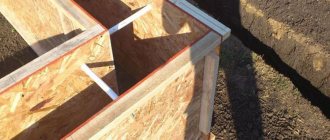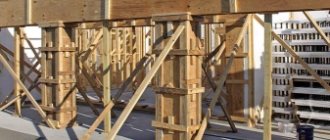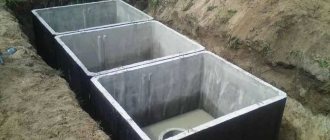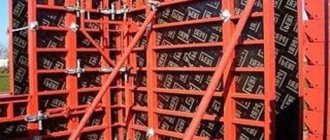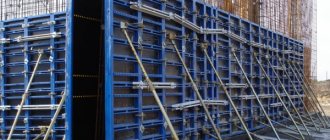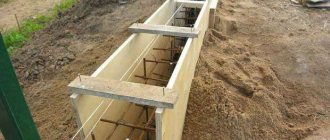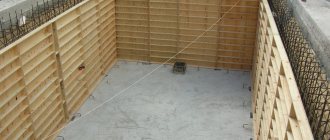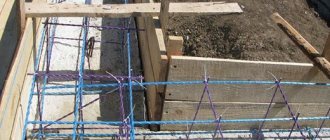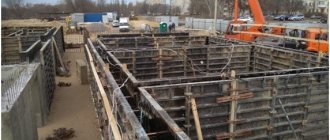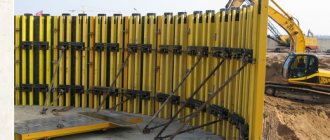For monolithic construction of large structures, the latest material has recently been used - plastic formwork. It is universal in the hands of experienced craftsmen and is a real construction set. For the manufacture of columns, walls, ceilings or foundations, removable, permanent or sliding plastic formwork is used.
Plastic reusable formwork
For reinforcement, fiberglass reinforcement can be used. The formwork tie is made of metal, but it can also be made of plastic. If you are planning single work, then a good solution would be to rent plastic formwork.
Areas of application of plastic formwork
The use of plastic formwork kits for monolithic construction is advisable in various fields of construction. Universal kits are used for concreting the following parts of buildings:
- Foundation. The formwork is equipped with panels of different sizes and shapes, so you can assemble a frame for pouring the foundation of various configurations.
- Walls. Using plastic formwork panels, you can quickly assemble a frame for pouring load-bearing walls and partitions.
- Floors. By combining the elements of the kits, you can assemble molds for casting floors of different sizes.
- Column. The kit includes special modules that allow you to cast columns in square, rectangular or round shapes.
The structural strength of plastic formwork elements allows them to be used not only in residential, but also in industrial construction. They can be used to build various small architectural forms, swimming pools, create arched entrance groups, bridges, etc.
Plastic formwork for monolithic structures
Monolithic construction in the modern world is the fastest and highest quality way to construct various types of buildings. The key element of this technology is the formwork, which is a frame for pouring concrete. Until recently, the pace of monolithic work was hampered by the imperfection of these systems, their large size, significant weight, and rather complex installation. A significant breakthrough in this area was the introduction of simple and quickly assembled frames, the basis of which are plastic modules.
Plastic formwork - what is it?
This is a system of shields made of a special composite material and elements fixing them to each other. It serves to give shape to the load-bearing structures of buildings - walls, foundations, support columns, floor beams. It has found wide application in the construction of multi-storey residential buildings, cottages, shopping complexes, and underground garages.
The main manufacturers and suppliers on the CIS market are:
- Geoplast (Geoplast SpA) is a “pioneer” in the production of formwork from composite materials, combining reasonable price and high quality.
- Kamplast Monolit Stroy LLC is the only Russian manufacturer of modules for pouring walls of various thicknesses, supporting round columns, foundations and floor slabs.
- LLC "PROMYSHLENIK M" - the company supplies high-quality systems from Western Europe and auxiliary devices for them.
Formwork elements
1. Panels – rectangular, square or curved, made of ABS plastic. Their inner surface, in contact with the poured concrete, can be either perfectly smooth or embossed, giving the outer layer of the structure a decorative appearance. The outer side is cellular, containing a large number of stiffeners; There are holes at the ends for clamps, and in the center for tie rods.
2. Clamps - special nylon handles that are inserted into the holes (locks) of the modules connected to each other and rotated at an angle of 90°, ensuring their tight and airtight joining.
3. Tie rods - long 16mm diameter screws with two nuts on both ends that securely hold two parallel panels together. To ensure that the tie bolts can be easily pulled out of the formwork after the concrete has hardened, they are initially passed through a plastic sleeve.
The system also includes additional accessories: struts with shoes, corner reinforcements. Depending on the required shape of the poured monolithic structures, the modules have a flat surface (for walls, foundations) or a concave surface with a different radius of curvature (for columns, pools, floors).
This indicator varies depending on the purpose of the frame: plastic small-panel formwork for walls and foundations, rectangular columns has a width from 200 mm to 600 mm; for oval and round structures – diameter from 250 to 1000 mm. Standard height is 1200 mm.
Benefits of use
1. Light weight - panels made of lightweight composite materials do not require lifting equipment for transportation, installation and removal.
2. Ease of installation - assembly of formwork does not require special skills and is carried out in strict accordance with the recommendations for their installation and drawings of poured monolithic structures.
3. Strength - a frame assembled from modules is capable of withstanding a huge load of the weight of poured concrete and reinforcing mesh.
4. Resistance to environmental influences - the material from which the panels are made is not sensitive to temperature changes, high humidity and direct sunlight.
5. Easy to clean - after removing the plastic formwork for monolithic construction, its surface does not contain hardened concrete; it is washed with ordinary water.
6. Versatility - the same panels can be used both for the foundation and for walls, partitions, and rectangular columns.
7. Durability - the application cycle exceeds 500 times.
8. Economic benefit - the construction of buildings using such a formwork system occurs with high quality and in a shorter time frame, which makes it possible to reduce the costs of their construction and obtain housing prices that are competitive on the market. Monolithic structures built using this technology, unlike panel and brick ones, are more durable and do not require frequent repairs during their operation.
Cost of plastic formwork systems
The price depends on its manufacturer, size and configuration. Geoplast panels have earned themselves a good reputation, for which you have to pay, while the products of poorly advertised companies in the field of monolithic construction will cost less. In the manufacture of large modules, more raw materials are used than for small ones, which makes their cost higher. Molds for pouring columns and pillars of round or oval cross-section have a slightly lower cost than rectangular ones.
| Name | Panel width (diameter), mm | Price, rubles | |
| Minimum | Maximum | ||
| For rectangular columns | 200 | 1100 | 1400 |
| 600 | 2700 | 2800 | |
| For round columns | 250 | 860 | 890 |
| 600 | 2100 | 2500 | |
| 700 | 5300 | 5500 | |
Advantages of plastic formwork
Plastic formwork has many positive qualities. Main advantages:
- Easy installation. The kit includes standardized elements, the maximum weight of which does not exceed 22 kg. Such light weight makes it easy to assemble the forms according to the project.
Advice! If necessary, the assembly of plastic formwork can be assembled by 1-2 people.
- Reusable. Removable formwork options can be used repeatedly.
Advice! Modern plastic formwork systems can withstand up to 200 cycles of use, including installation, pouring concrete and dismantling.
- Load resistance. The forms are highly durable and can easily withstand the pressure of the concrete mixture.
- Affordable price. Compared to metal forms, plastic formwork has a more favorable price.
- Tightness. When assembled correctly, the joints of the forms are sealed, which eliminates leakage of the concrete mixture.
- Easy dismantling. Concrete mortar does not stick to plastic surfaces, so when dismantling the forms there are no problems with separating the panels from the frozen monolith.
- Versatility. Plastic forms allow you to realize the most daring design solutions. You can concrete not only vertical and horizontal elements, but also curved parts.
- Economical. Assembling forms does not require the efforts of a large construction team and the use of special equipment, which allows you to save on paying for the services of workers and renting equipment. In addition, processing plastic panels requires a minimal amount of lubricant to prevent the concrete mortar from sticking.
- Perfectly maintained geometry. Plastic parts have precise dimensions and do not need to be adjusted when performing installation work.
- Resistance to climatic influences. Plastic perfectly tolerates moisture, ultraviolet radiation and temperature changes.
Types of plastic formwork
Plastic formwork kits are classified according to different criteria. By area of application, the following varieties are distinguished:
- Universal small panel kits. This plastic formwork is used for foundations, walls, as well as horizontal elements - beams, lintels.
- For columns. You can purchase kits for creating columns of different shapes - square, rectangular, oval, round.
- For floors. These are modular structures for casting interfloor slabs and other horizontally oriented structures;
- Radial. Such kits include flexible molds, thanks to which you can cast objects with a curved surface.
In addition, there are removable or reusable formwork options, as well as permanent forms.
Removable
A universal solution is to use small-panel plastic formwork for walls. Its use makes it possible to cast not only walls, but also other structures - foundations, columns. The set of removable plastic formwork includes:
- linear panels – for assembly in straight sections;
- corner elements are used for casting internal and external corners;
- column elements - rectangular or square;
- elements of round columns.
Special locks are used for assembly. Removable plastic formwork is used in a wide variety of construction areas.
Fixed
Permanent plastic formwork systems are forms that, after the concrete solution has hardened, will become an integral part of the monolithic structure. For the manufacture of permanent forms, polystyrene foam is most often used.
This is a relatively inexpensive material with minimal weight, so there are no problems during unloading and assembly. In addition, the material has thermal insulation properties, which allows you to save on additional insulation of structures.
Removable and permanent formwork
According to the nature of dismantling, it can be divided into 2 categories: removable formwork, or what is called permanent formwork. A permanent structure means pouring a concrete mixture into a formwork that, upon completion of construction, will become “part” of the building.
That is why it is most effective to use the qualities of permanent formwork when building walls or a monolithic foundation.
The first appearance of permanent formwork dates back to the 60s in Austria and since then its popularity has been increasing.
It is made mainly from expanded polystyrene - a cheap and very light material that is capable of permeating air, but at the same time has excellent thermal insulation properties.
Expanded polystyrene is excellent for making permanent formwork for foundations and other reinforced concrete structures. It is able to withstand aggressive chemical environments, the harmful effects of moisture and is safe for human health. And its cellular structure allows it to withstand significant pressure from concrete masses, which is typical for a foundation.
Installation and dismantling of formwork
The rules for installing and dismantling plastic formwork are quite simple. The work is carried out in the following order:
- clear the construction site, the base must be level and clear of debris;
- check the condition of the mounting elements, they must be clean;
- install the reinforcement frame;
- installation begins with the installation of corner elements, then the shields are sequentially fastened. Each element is securely secured using special locks;
- elements are assembled according to the principle of parts of a children's Lego construction set;
- after all the parts are assembled, an additional check of the assembly quality is carried out;
- only after this can you start pouring the concrete solution;
- dismantling work begins when the solution has gained at least 70% strength;
- All formwork elements are inspected and thoroughly cleaned. They are then transported to another construction site or for storage.
Modular plastic formwork systems are a convenient and cost-effective solution. The use of plastic products allows for the construction of objects for various purposes, including structures of complex configurations. The use of ready-made plastic molds can significantly reduce labor costs.
